A listing of Perkins faculty publications for 2019-20 is now available. Download A Selection of Publications by the Perkins School of Theology Faculty here.
Category: Faculty
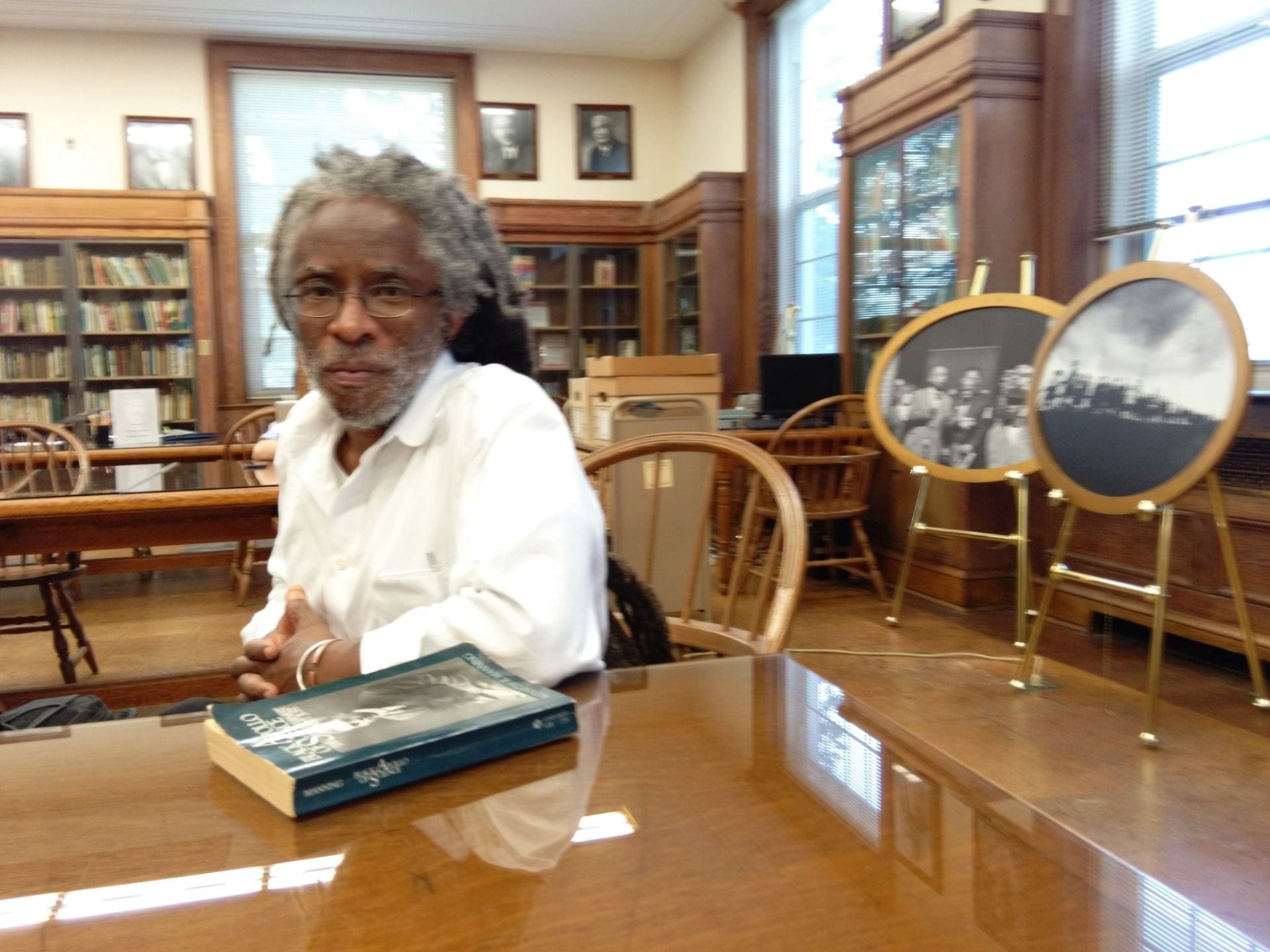
Theodore Walker, Jr., will never forget the moment. After months spent sifting through old papers and documents, he came across the object of his 15-year search: the lost manuscript of a never-published book by the prominent scientist Ernest E. Just.
“It was definitely a happy dance moment,” said Walker, who is Associate Professor of Ethics and Society at Perkins.
The discovery stemmed from an interest in science that Walker had cultivated as an undergraduate at the University of North Carolina in Chapel Hill. Decades later, after earning a PhD in theological inquiry from the University of Notre Dame, and after joining the Perkins faculty in 1986, one of his UNC-CH teachers, the eminent history of religions scholar Charles H. Long, urged him to study the works of E. E. Just, an African-American scientist who made pioneering contributions to cell biology.
“At the time, that was a very curious thing,” said Walker. “I’m a theologian and an ethicist. Why was he encouraging me to study a biologist?”

Walker began to read the works of Ernest Everett Just (1883-1941), who taught biology in the department of zoology at Howard University from 1909 to 1941. He also read Black Apollo of Science: The Life of Ernest Everett Just (1983) by MIT historian of science Kenneth R. Manning. Manning’s book described how, in 1919, Just was the first scientist to observe that when a spermatozoon penetrates the surface of an egg cell, a “wave of negativity” radiates around the egg’s surface, repulsing all other sperm. In honor of his accomplishments, Just was featured in a 1996 U.S. Postal Service Black Heritage postage stamp.
In his many published papers and books, occasionally, Just made brief comments about the ethical implications of new discoveries in cell biology. In the last few years before his death in 1941, Manning’s book reported, Just wrote a work titled “The Origin of Man’s Ethical Behavior.” He died before finding a publisher, and the manuscript was lost. The possibility of finding that manuscript tantalized Walker, whose academic focus includes the link between science and ethics.

Armed with research funding from Perkins, and from the SMU University Research Council, and with help from archival researcher Lillie Jenkins Walker (who is his wife) and two cell biologists, W. Malcolm Byrnes and Stuart Newman, he searched for the manuscript. In May 2018, the Walkers found 251 manuscript pages preserved among the collected papers of E. E. Just at the Howard University Library Moorland-Spingarn Research Center. And it was even more intriguing and promising than he’d hoped.
“I was just blown over at what an astonishing book this was,” said Walker. “By then I had studied enough biology to appreciate the biology. But I was also stunned by his work in moral theory and its connections to science.”
The unpublished book presents a cell biology-rooted theory of the origin and evolution of ethical behaviors. According to Just, human ethical behavior evolved from previous creaturely behaviors originating from cooperative behaviors (mutual aid, not only competitive struggle/survival of the fittest) among our most primitive single cell ancestors. This was the first time that ethical behavior had been traced to evolution from primitive cellular origins by a cell biologist.
“Cooperation at the cellular level is something that was described in 2018 as a new and stunning discovery in cell biology,” he said. “We are just now catching up to where Ernest E. Just was during the 1930s.”
Just was ahead of his time, Walker added; one of the disadvantages of being ahead of one’s time was that readers were not prepared to listen to what he had to say in 1941. Before his death, Just had submitted the work to a number of reputable publishers, all of whom declined.
“The publishers didn’t see an audience for this work, and at the time, and I think they were correct,” Walker said. “Biologists were not going to be interested in a book about ethics, and ethicists were not in the habit of paying attention to biology. But today we have a huge body of literature called bioethics. I think the world is now prepared to hear what he has to say.”
Just had formulated a “law of environmental dependence” which asserted that our existence is dependent upon mutually beneficial relations to others and the environment.
“In the late 1930s, when he formulated this idea, nobody else was interested in talking about environmental dependence,” Walker said. “Today it is right on point. We recognize that we need to be thinking about bio-ethical relations to the environment.”
Walker and his team are now in the process of editing the manuscript to submit for publication. Some portions were handwritten and required transcribing. The body of the text of the manuscript is complete and publishable. The only remaining missing part is an annotated bibliography, which the researchers have been able to largely reconstruct.
“This manuscript, missing for 77 years, is destined to become an important book in the history of biology and ethics,” Walker said. “It is stunningly good, beautifully written and profoundly important.”
Faculty Update

Evelyn Parker in South Africa
Evelyn Parker, Susanna Wesley Centennial Professor of Practical Theology, is in South Africa as a 2019-2020 U.S. Fulbright Scholar. She’s based at the Desmond Tutu Centre for Religion and Social Justice and the Department of Theology and Religion at the University of Western Cape in Cape Town, working on a project titled “Role of Religious Leaders in Preventing and Intervening in Teen Dating Violence in South Africa.” As Parker gets to know the young women studying there, she says, “Their stories weave a beautiful tapestry of characteristics that include sassiness, savviness, tenacity, courage, resistance, and persistence.” Read more of her early impressions in her blog post, Unshouted Courage in South Africa: The Young Women of the University of the Western Cape.
Rebekah Miles Receives Hendrix Award

Rebekah Miles, Professor of Ethics and Practical Theology at Perkins, has been named one of three Odyssey Medal Recipients by Hendrix College. The medals are presented by the Hendrix College Board of Trustees to individuals whose life achievements exemplify the Hendrix Odyssey Program. Miles, a 1982 Hendrix graduate, was honored for her research; the other two recipients, T. Patterson Clark and Michael Mills, were honored for artistic creativity and leadership and professional development, respectively.
Established in 2004, the Odyssey Program requires all Hendrix College students to complete three Odyssey experiences or projects during their undergraduate careers and helps ensure that students look beyond the classroom to experience educational opportunities in the liberal arts and sciences.
A reception and medal presentation with Hendrix President William M. Tsutsui will take place on November 14 in the Great Hall of the Clinton Presidential Center in Little Rock. Read the Hendrix press release here.
Hendrix College has a longstanding relationship with the United Methodist Church and receives support from the Arkansas Annual Conference, and numerous United Methodist congregations and lay persons from throughout Arkansas. In 2018, Hendrix and Perkins signed a Memorandum of Understanding (MOU) providing special admissions consideration to Hendrix grads considering a seminary education.
Ted Campbell Film Premiere

Ted A. Campbell’s film, Five Waves Over Dallas, premiered on October 23 at Crum Auditorium in the Collins Center. The documentary tells the story of the overlapping migrations that shaped the Dallas area over the past 250 years—from the earliest native-American tribes to today’s global diversity. After the screening, Campbell led a discussion of the movie and answered audience questions.
Campbell, who is Professor of Church History at Perkins, wore many hats in the creation of this production.
“I researched and wrote the script, directed the video, and took almost all of the still shots and drone shots that are used in the documentary,” Campbell said. “I also wrote the orchestral background music and performed one background song on guitar.” A team of undergraduate film students helped with the interviews and other video, and a group of undergraduate acting students handled the voiceovers and transitional scenes.
The film also deals with the religious cultures that waves of migrants brought with them, including Presbyterian, Methodist, Baptists, and the movement that would lead to Churches of Christ and Disciples of Christ for the “Second wave” of settlers that included British-American and enslaved African-American settlers. Then, in the late nineteenth century, Catholics and Jews were part of the wave of Europeans that came to the Dallas area. The final (fifth) waves from the Immigration and Nationality Act of 1965, brought newer religious traditions (for instance, Islam) to the Dallas area.
A separate, Spanish-language premiere is tentatively planned for November 12. View the video online at by clicking here.
Robert Hunt Speaks – Often
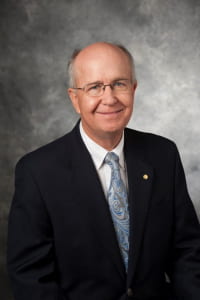 October has been a busy month for Robert Hunt, whose speaking schedule included: completing the final session of a multi-part program on Global Methodism at FUMC Richardson on October 7; moderating the discussion for Dialogue Matters, featuring Dr. Charles Kimball on “Truth over Fears” at the Richardson Civic Center on October 10; speaking at “Stemming the Tide of Hate,” a daylong conference hosted by CAIR-DFW on the campus of SMU on October 12; speaking on “The Intellect in Christian Tradition: at Faiths in Conversation at Thanksgiving Square on October 14, and finally, moderating and hosting the 2nd annual Religious Freedom Summit at SMU on October 24. In addition, Hunt was quoted in a column by Robert Wilonsky in the Dallas Morning News in response to comments by Robert Jeffress, pastor of First Baptist Church in Dallas, who denounced efforts to impeach President Donald Trump. Hunt’s quote was also cited in this column in the Baptist News Global.
October has been a busy month for Robert Hunt, whose speaking schedule included: completing the final session of a multi-part program on Global Methodism at FUMC Richardson on October 7; moderating the discussion for Dialogue Matters, featuring Dr. Charles Kimball on “Truth over Fears” at the Richardson Civic Center on October 10; speaking at “Stemming the Tide of Hate,” a daylong conference hosted by CAIR-DFW on the campus of SMU on October 12; speaking on “The Intellect in Christian Tradition: at Faiths in Conversation at Thanksgiving Square on October 14, and finally, moderating and hosting the 2nd annual Religious Freedom Summit at SMU on October 24. In addition, Hunt was quoted in a column by Robert Wilonsky in the Dallas Morning News in response to comments by Robert Jeffress, pastor of First Baptist Church in Dallas, who denounced efforts to impeach President Donald Trump. Hunt’s quote was also cited in this column in the Baptist News Global.
Mental Health and Faith
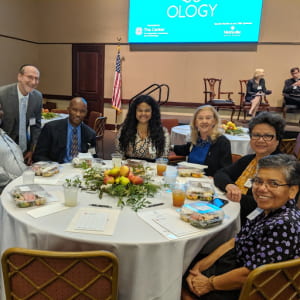 Jeanne Stevenson-Moessner recently attended “A Dialogue on Mental Health and Faith,” an October 23 gathering of faith leaders and mental health professionals hosted by The Center for Integrative Counseling and Psychology.
Jeanne Stevenson-Moessner recently attended “A Dialogue on Mental Health and Faith,” an October 23 gathering of faith leaders and mental health professionals hosted by The Center for Integrative Counseling and Psychology.
Participants pictured (right to left) are Right to left: Sister Maria Gomez, Chaplain Methodist Health System; the Rev. Beatriz Pacheco (M. Div. ’03), Certified ACPE Educator, Methodist Dallas Medical Center; Jeanne Stevenson-Moessner; the Rev. Willacin “Precious” Gholston (M. Div. ’09), Manager of CPE Programs, ACPE Certified Educator, Methodist Health Systems; the Rev. Donny Marandure, Manager of Pastoral Services, Methodist Richardson; Rabbi Michael Cohen; the Rev. David Impwi (M. T. S. ’02), Chaplain, Methodist Health System; and the Rev. Dr. Elias Lopez (M. Div. ’10, D. Min. ’18), Director Methodist Health Systems.

The Rev. Dr. Rebekah Miles isn’t happy with the current direction of politics, whether in our nation or in the United Methodist Church. But she’s not ready to give up on either battle. She’s politically active, both in secular politics and church politics.

If you live in Tarrant County, she might ask whether you’re registered to vote. As a deputy voter registrar in Tarrant County, she carries voter registration cards wherever she goes and hands them out whenever she can. She’s logged a lot of miles canvassing neighborhoods.
“Many young people, including those in African-American and Latinx communities, are not registered to vote,” she said. “I want to encourage them to participate in the system, regardless of how they might vote.”
Miles also participates actively in United Methodist church politics, having served five times as a clergy delegate from the Arkansas Conference. She’s busy now preparing for the next General Conference.
“I write and advocate for legislation, serve on strategy teams, write articles about the options before the United Methodist Church,” she said. “I was on the One Church strategy team before the last General Conference and have continued on another strategy team in preparation for the next.”
Two favorite Bible verses help guide her work and life: Ezekiel 36:26 (“A new heart I will give you, and a new spirit I will put within you; I will take from your body the heart of stone and give you a heart of flesh” and 2 Corinthians 3:18 (“And all of us, with unveiled faces, seeing the glory of the Lord as though reflected in a mirror, are being transformed into the same image from one degree of glory to another; for this comes from the Lord, the Spirit.”)
“Like many Wesleyans, I think a lot about the power of the Spirit with us and the way God helps transform us,” she said. “All of us can try to keep that Spirit of God within us.”
At this point, she admits, it’s difficult to see how the Spirit is working in the denomination’s polity. Like many United Methodists, she’s frustrated by the current stalemate.
“At this point, I’ll take any way forward that works,” she said. “Anything that gets us somewhat out of the mess we’re in now.”
Teaching Specialties
Ethics and theology, including United Methodist Doctrine; 20th century theological ethics; early Christian ethics; spiritual autobiography; feminist, womanist and mujerista theologies.
Research Interests
Wesleyan theology and ethics, ethics and family, clergy ethics, Georgia Harkness, Reinhold Niebuhr, Christian realism and feminist theology, death. Miles is currently writing articles on recent theological ethics in the U.S. and plans to return soon to a book project on the subject of death.
Book on Her Nightstand
Social Ethics in the Making by Gary Dorrien, The Responsible Self by H. Richard Niebuhr, Soul Feast by Marjorie J. Thompson and The Eye of the World, part of the Wheel of Time series by Robert Jordan. A fan of fantasy novels, Miles also just finished Ursula LeGuin’s Earthsea Cycle Series.
Fantasy Dinner Party
Miles would invite one or all of the three persons of the Trinity. Questions she’d ask to get the conversation rolling: “What has mattered in my life and the lives of people I love? You see a bigger picture than we do. Where have we screwed up? What has gone right? What went wrong but is being made right? Where have you been active in all of this?”
Miles said: “I am guessing there is good reason that we don’t and cannot know things like that, but I would still like to know. I’m curious. I like to think that at some point after we die, we will be given some insight about it.”
Family
She’s been married almost 39 years to her husband the Rev. Len Delony, also a United Methodist clergy member. (Len is a 49-year cancer survivor who was treated at St Jude’s starting in 1970). The couple has two daughters: Anna, who turns 21 in October, a senior business major at Oklahoma City University, a United Methodist-affiliated liberal arts college; and Katherine, 19, a sophomore at SMU triple majoring in art history, English literature and education.
Pets
The Miles family has a lot of pets, maybe a few more than Rebekah Miles would prefer. “We have a 9-year-old chiweenie named Chancy,” she said, although the family prefers “Dachsu-wa-wa” over chiweenie. “Currently we are keeping our daughter’s 1-year-old cat, Cheeto, and we have a huge 15-year-old outdoor male cat named Cutie Kitty. My girls were 4 and 6 when they named him!”
The list goes on: Two bearded dragon sisters belonging to Anna named Noam (after Noam Chomsky) and Zelda (after Zelda Fitzgerald.) But the recent re-homing of a member of the Miles menagerie gives her hope.
“Last week we were praising God when our younger daughter gave her spotted leopard Gecko Ros (short for the scientist Rosalind Franklin) to a friend,” she said. “One pet down….”
 Hobbies
Hobbies
Reading novels; UM church politics; walking. “Lately I’ve been doing a lot of scootering on SMU campus and trying to enlist others to scooter with me,” Miles said.
What You May Not Know About Her
Miles was a crack tuba player in junior high and high school and aspired to one day join the International Brotherhood of Tubists. She no longer plays the tuba but does daydream about again one day taking up another instrument she played in high school, the string bass.
Signature Dish
“Gumbo. My family is Cajun. I also make a good court bouillon and red beans and rice.”
Personal Spiritual Practices
Most days, she tries to make time to read scripture; listen to music of faith; read three daily devotions; engage in silent contemplative meditation and prayer; write down a few key grace moments of the day before; engage in acts of mercy; and try to be a good citizen.
Said Miles: “I try, often unsuccessfully, to remember that most of the things I do over the course of a day – teaching, research, service to my school and church, care for family and pets — can be prayer. That’s true for all of us.”
Faculty Update

Jack Levison Meets the Pope
Last spring was eventful and travel-filled for Jack Levison, W. J. A. Power Professor of Old Testament Interpretation and Biblical Hebrew.
On April 3, Levison lectured at the University of Bern as part of a series of public guest lectures incorporated in a course on the Theology of the New Testament.
Entitled “Filled with the Spirit: From the Old Testament to the New,” the lecture offered a unified perspective on how the Holy Spirit is viewed as the source of inspiration in interpreting scripture.
Later in the month, Levison traveled to Rome to meet with the Rev. Andrea Ciucci and Dr. Nunziata Comoretto, of the Vatican’s Pontifical Academy for Life. Levison made this trip from Munich, where he was doing research, because he is co-editing a book on palliative care. “The people at the Vatican wanted to talk to me about their role in this book, which includes essays from an array of international experts,” Levison said.
The book is based upon a Spirituality for Life Conference held in Houston in September 2018. The ecumenical conference, sponsored by the Vatican, Houston Methodist Hospital and MD Anderson Cancer Center, brought together palliative care and spiritual leaders to explore ways to integrate spirituality into palliative clinical practice. Robert L. Fine, MD, Clinical Director, Office of Clinical Ethics and Palliative Care at Baylor Scott and White Health in Dallas, is Levison’s co-editor.
During his visit, Vatican officials invited Levison to join an audience with the Pope, an experience he found moving and eye-opening. “It’s absolutely remarkable in our day and age, in a time of such harshness and divisiveness, to witness the humility Pope Francis embodies,” he said. “I was so moved by the atmosphere of peace and respect in the room.”
Levison notes that he’s the second person in his family to meet the pope. His spouse, Priscilla Pope-Levison, Perkins’ associate dean for external programs and professor of ministerial studies, met Pope Francis at the Vatican in October 2017.
With the recent publication of his new book, The Holy Spirit before Christianity (Baylor, 2019), Levison’s fall schedule includes an October 6 author event at Wilshire Baptist Church in Dallas and a weekend speaking engagement (October 12-13) at First United Methodist Church Missouri City, Texas, a suburb of Houston.
McKenzie at North Georgia Conference

Dr. Alyce McKenzie recently served as a consultant for the North Georgia Conference of the United Methodist Church in a retreat center in Peachtree City, Georgia, in August.
Her visit began with a daylong workshop on “Marks of Effective Sermons Across Cultures” with clergy and lay members of the conference’s Board of Ordained Ministry, to help board members in their evaluation of candidates’ sermons.
Next, she led a two-day workshop with the first- and second-year Residents in Ministry focused on the subjects of “Best Practices for Memorable Sermons” and “Making a Scene in the Pulpit: Vivid Preaching for Visual Listeners.”
Dr. McKenzie also preached at the closing worship service, led by the Residents in Ministry, on Romans 10:14-17, with the title “Somebody’s Calling!”
Robert Hunt on Podcast
Robert Hunt was recently interviewed for two episodes of the podcast Good God: Conversations with George Mason About Faith and Public Life. In Episode 70, Hunt weighed in on the cultural implications of the United Methodist decision to adhere to traditionalist views of marriage practices. In Episode 73, he talked about evangelism in a pluralistic world: How can Christians engage in relationships with people of other faiths or no faith and still offer what we believe is a life of beauty and truth? Listen to Episode 70 of the podcast at https://goodgodproject.com/podcast/episode70 and Episode 73 at https://goodgodproject.com/podcast/episode73
Ted Campbell Quoted in WaPo Story
Confederate monuments have been the center of controversy in recent years in Charlottesville, Va. Now they’re the subject of Bible studies in two United Methodist churches there that “reinterpret the statues as idols meant to prop up the false religion of white supremacy.” Read the story, including a quote from Ted Campbell, Professor of Church History, here.
Faculty Profile: Susanne Scholz
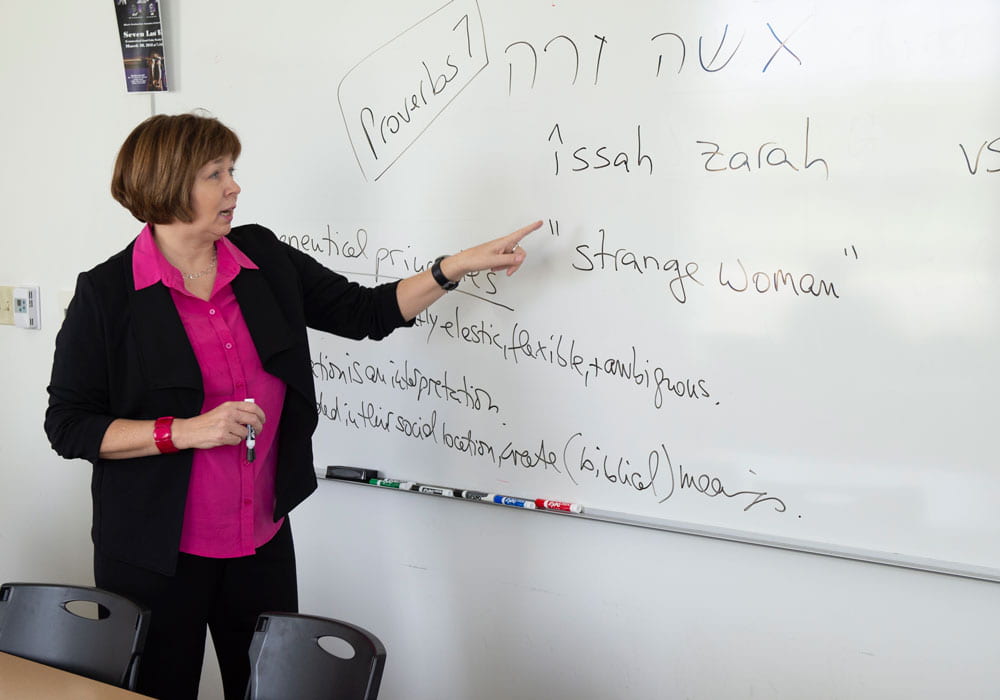
As a Professor of Old Testament, Susanne Scholz has devoted her professional life to the study of texts that are ancient — but far from irrelevant. Many Christians look to them for insights on contemporary issues like abortion and the Israel/Palestine conflict – and often, without a deep understanding of history, politics and social location, all profoundly shaping the interpretation of the Bible.
That’s the uphill battle that Scholz has accepted as her professional challenge, and she’s very passionate about it.
“I have an acronym for the way many Christians read the Bible today: PPS — privatized, personalized and sentimentalized,” she said. “It drives me nuts. It’s dangerous. People get killed –intellectually and spiritually and politically killed. I feel driven to make a dent in all the ignorance.”
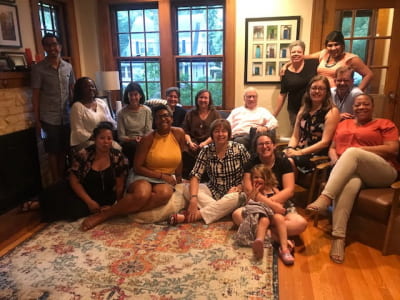
On that academic quest, Scholz traveled to New York and to Israel/Palestine this summer, in both cases on a search for the truth of Old Testament texts that might help shed clearer light on today’s debates.
Scholz spent July in New York, on a deep dive into Numbers 5:11-31, as part of the CrossCurrents Summer Research Colloquium. The fellowship gathered scholars working on projects related to reproductive justice, giving them access to libraries and research facilities at Columbia University, Union, Auburn, and Jewish Theological Seminaries. Fellows do independent research and then gather for discussion and meals each night. (Reproductive justice is another key focus for Scholz; last spring, she spearheaded an interdisciplinary symposium at SMU on reproductive justice, a conceptual framework based on three broad principles that 12 African American women activists developed in the 1990s: the right not to have a child, the right to have a child, and the right to raise children in safe and healthy communities.)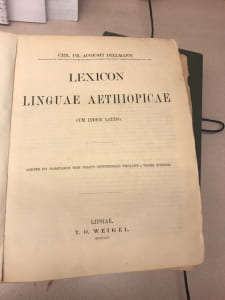
She chose to study Numbers 5:11-31 because some believe the text depicts an abortion; it’s cited in both pro-life and pro-choice arguments. The passage describes an “ordeal by bitter water,” a test designed by a priest to determine whether a woman suspected of adultery was guilty or innocent.
The question that gripped Scholz: Was the woman in the story an adulteress or was she not rather “seduced” and thus possibly a rape victim survivor? To find an answer, she tracked down the definition of a single word, found only in an 1865 Ethiopic Latin dictionary that she unearthed in Columbia University’s library. Her conclusion: the translation possibilities are ambiguous, as is typical of sacred texts like the Bible. It’s possible that “seduced” was used as a euphemistic expression for rape, which opens up a very different view about the woman and her entire ordeal depicted in Numbers 5, also called “The Sotah” in the Jewish tradition where this passage is famous.

Scholz also traveled to Israel/Palestine this summer and visited, among many other places, Tel Shiloh, an archaeological site identified as the location of the ancient city of Shiloh in Samaria. (Shiloh is mentioned in many places in the Bible, including in the story of Hannah and the Ark in 1 Samuel.)
Plans are to turn Tel Shiloh into a major tourist attraction site on the West Bank. Leaders of the Christian Right, including former Arkansas governor Mike Huckabee, visited Shiloh, and U.S. donors sympathetic to West Bank settlers support the development.
“Because the site is located on the land of the Palestinian village Qaryut, the project has broad political implications,” she said. “The Christian Right and Israeli settlers are saying that Shiloh was the first capital of Israel, which is a total invention, and they are in the process of making the site into an attraction like Disney World. I find that deeply upsetting.”
One of the Christian Right groups that currently supports the fourth archaeological season scheduled for the summer of 2020 at Tel Shiloh is the Associates for Biblical Research (ABR), which describes itself as a “Christian apologetics ministry dedicated to demonstrating the historical reliability of the Bible through archaeological and Biblical research.” Scholz says project leaders lack solid academic credentials and they conflate biblical history with the origins of modern Israel.
“It is a misleading but popular hermeneutical strategy among many Christians and Jews,” she said.
She fears the project will skew American tourists’ view of the Israeli-Palestinian conflict and unfairly buttress Israeli settlers’ claims to the West Bank. During her visit, a Palestinian guide showed her the area and described the difficult living conditions for Palestinians in the West Bank.
Scholz will present her research in September, in a talk titled “The Disney-fication of Shiloh,” at the European Society of Women in Theological Research (SWTR) International Meeting in Leuven, Belgium.
Teaching Specialties
Hebrew Bible/Old Testament; gender in biblical literature; Hebrew Bible in film; historiography; narrative literature; social location and biblical hermeneutics
Research Interests
Feminist hermeneutics; epistemologies and sociologies of interpretation; cultural and literary studies; violence against women in sacred texts
Favorite Bible Verses
Genesis 1:1-2, which she recites in Hebrew at the beginning of each class. The first verse begins with the consonant bet in the word bereshit; this consonant is the second letter of the Hebrew alphabet and is assigned the number 2. Jewish sages pondered: if the Torah is perfect, why does the Bible not begin with aleph, the first letter of the Hebrew alphabet, standing for 1 and unity and God? “It’s because the moment we are created, we are in duality,” Scholz explains. “The moment we read the Bible, we are in duality, in the world. We are not in God’s oneness anymore.”
Books on Her Nightstand
Scholz loves reading non-fiction; she discovers many of the books on her reading list through C-SPAN’s Book TV series. Two current books: The Age of Surveillance Capitalism: The Fight for a Human Future at the New Frontier of Power by Shoshana Zuboff, and The New Authoritarians: Convergence on the Right by David Renton.
Fantasy Dinner Party
Not surprisingly, Scholz would invite five prominent figures of the Bible: Jesus, Mary Magdalene, Moses, Hagar and Miriam. Questions she’d ask: “Did you really exist?” and “You gave us so much and yet we are so much in a fog. Tell us what you really think and what you really did.”

Pets
Wisky-Carlos, a 19-lb., well-traveled Himalayan cat born in Texas ten years ago.
Signature Dish
While on a study retreat in a cottage in Newfoundland this summer, she developed her own recipe; it’s a barbecued cod, baked in foil with onions, mustard seed, a little red pepper, and butter.
Something Most People Don’t Know About Her
“I can stand on my head for 10 minutes,” she said. “It’s a pose called sirsasana in yoga, which is my way of relaxing. However, I can’t do padmasana, the pretzel pose. Only God and my knees know why.”
Faculty Update
Robert Hunt, Director of Global Theological Education, will participate in Faiths in Conversation, a four-part program presented this fall by Interfaith Council of Thanks-Giving Foundation, Perkins School of Theology and The Dallas Institute on September 9, October 14, November 11 and December 9. The series will look at the question, “How can we escape our silos and find intersections of the diversity of faiths with which Dallas is so rich?” The opening conversation on September 9th, at The Dallas Institute, will feature panelists from five faith traditions–Buddhist, Christian, Hindu, Jewish, and Muslim – and four universities – Rice University, Southern Methodist University, University of Dallas, and UNT Dallas. Hunt will speak briefly on the Christian tradition that evening; on subsequent evenings he will serve as moderator. Each event runs from 7–8:30 p.m., preceded by a reception at 6:30 p.m. Tickets are free for students. For details and tickets, visit the website.
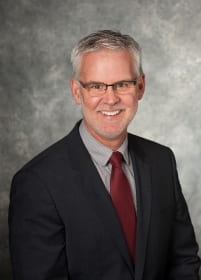 Jack Levison at 2020 Pusey Conference
Jack Levison at 2020 Pusey Conference
Jack Levison, Perkins’ W. J. A. Power Professor of Old Testament Interpretation and Biblical Hebrew, will speak at the Pusey House Theological Conference, July 6-8, 2020, at the University of Oxford in England. With the theme “Descent of the Dove: Knowing and Loving in Spirit and Truth,” the focus of the 2020 conference will be the person and work of the Holy Spirit, and the inevitable transformation which any encounter with the Holy Spirit both invites and enables. The 2020 conference is the third of a series following conferences in 2016 and 2018, “A Transforming Vision: Knowing and Loving the Triune God” (2016), and “Totus Christus: Knowing and Loving the Son of Man” (2018). Other speakers lined up for the Conference include Kallistos Ware, Assistant Bishop in the Greek Orthodox Archdiocese of Thyateira and Great Britain; Rowan Williams, Master of Magdalene College, Cambridge; and N T Wright, Professor of New Testament and Early Christianity, University of St Andrews.
 Paula Dobbs-Wiggins elected Parkland Board Chair
Paula Dobbs-Wiggins elected Parkland Board Chair
During a July 24 special election, the Parkland Health & Hospital System Board of Managers unanimously elected Paula Dobbs-Wiggins, MD, to serve as its chairwoman. Dr. Dobbs-Wiggins, retired Professor of the Practice of Pastoral Care at Perkins, was named to the Board in November 2013. She is a board-certified psychiatrist and Distinguished Fellow of the American Psychiatric Association and is in private practice in Dallas. She is as an ordained minister and member of Saint Luke “Community” United Methodist Church.
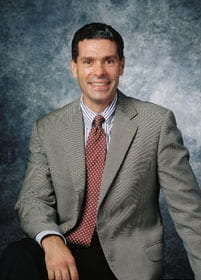 Recinos speaks at District Resource Day
Recinos speaks at District Resource Day
Harold Recinos will speak at the Connecticut/Western Massachusetts District’s Resource Day on Saturday, September 28, at Trinity United Methodist Church in Springfield, Mass. Recinos will speak on “Jesus the Stranger Brings Down the Walls of Dividing Hostility.” He is an ordained elder in the Baltimore-Washington Conference and professor of Church and Society at the Perkins.
Recinos was also recently featured in a profile in the Dallas Morning News. Read “Grit and grace: SMU’s Hal Recinos left street life to become poet and professor” here.
Publishers Weekly recently highlighted a new book by Stephen Long: Truth Telling in a Post-truth World by Stephen Long (Sept. 1, trade paper, $28.99, ISBN 978-1-945935-50-3). Long, a professor of ethics at Perkins, argues that truth promotes personal flourishing and that readers can practice truth telling as a principle of faith.
 Wes Allen Cooks Up Meatball Exegesis
Wes Allen Cooks Up Meatball Exegesis
Wesley Allen, Jr., Lois Craddock Perkins Professor of Homiletics at Perkins, led an August 26 preaching workshop at Northern Hills UMC in San Antonio. Titled “Meatball Exegesis: The Busy Pastor’s Guide to Biblical Exegesis for Preaching,” the program offered guidance for pastors on a process by which the preacher can identify one clear theme that is faithful to the text and fitting for her/his congregation.
Obituaries
Susie Banks: The surviving spouse of the late Rev. Dr. C. Wayne Banks, assistant professor of Christian Education and associate director of field work at Perkins from 1957 until his retirement in 1982, Susie Banks died on June 6 in Longmont, Colorado, following a lengthy illness. Services were held July 12 in Longmont. She was on the staff of WFAA-TV in Dallas from 1970 until her retirement in 1990, when the couple moved to Colorado to be near their children and grandchildren. Read her full obituary here. Susie is survived by her daughter, Jane Banks Roberts, of Longmont, her son, Charles W. Banks Jr., of Sulphur, La., two granddaughters and a sister. Condolences may be sent to Jane and Charles at these addresses:
Jane Banks Roberts
2450 Airport Road, Apt. E141
Longmont, CO 80503
Charles W. Banks Jr.
6454 Ursan Drive
Sulphur, LA 70665-7663
Faculty Books
[fusion_builder_container hundred_percent=”no” hundred_percent_height=”no” hundred_percent_height_scroll=”no” hundred_percent_height_center_content=”yes” equal_height_columns=”no” menu_anchor=”” hide_on_mobile=”small-visibility,medium-visibility,large-visibility” class=”” id=”” background_color=”” background_image=”” background_position=”center center” background_repeat=”no-repeat” fade=”no” background_parallax=”none” enable_mobile=”no” parallax_speed=”0.3″ video_mp4=”” video_webm=”” video_ogv=”” video_url=”” video_aspect_ratio=”16:9″ video_loop=”yes” video_mute=”yes” video_preview_image=”” border_size=”” border_color=”” border_style=”solid” margin_top=”” margin_bottom=”” padding_top=”” padding_right=”” padding_bottom=”” padding_left=””][fusion_builder_row][fusion_builder_column type=”1_4″ layout=”1_4″ spacing=”” center_content=”no” link=”” target=”_self” min_height=”” hide_on_mobile=”small-visibility,medium-visibility,large-visibility” class=”” id=”” background_color=”” background_image=”” background_position=”left top” background_repeat=”no-repeat” hover_type=”none” border_size=”0″ border_color=”” border_style=”solid” border_position=”all” padding_top=”” padding_right=”” padding_bottom=”” padding_left=”” dimension_margin=”” animation_type=”” animation_direction=”left” animation_speed=”0.3″ animation_offset=”” last=”no”][fusion_imageframe image_id=”1784″ style_type=”none” stylecolor=”” hover_type=”none” bordersize=”” bordercolor=”” borderradius=”” align=”center” lightbox=”no” gallery_id=”” lightbox_image=”” alt=”” link=”” linktarget=”_self” hide_on_mobile=”small-visibility,medium-visibility,large-visibility” class=”” id=”” animation_type=”” animation_direction=”left” animation_speed=”0.3″ animation_offset=””]https://blog.smu.edu/perkins/files/2019/08/Abraham-Divine-Image-and-Divine-Action-Vol-3.jpg[/fusion_imageframe][fusion_text]
William J. Abraham
Divine Agency and Divine Action, Volumes I, II and III
Oxford University Press (2019)
[/fusion_text][/fusion_builder_column][fusion_builder_column type=”1_4″ layout=”1_4″ spacing=”” center_content=”no” link=”” target=”_self” min_height=”” hide_on_mobile=”small-visibility,medium-visibility,large-visibility” class=”” id=”” background_color=”” background_image=”” background_position=”left top” background_repeat=”no-repeat” hover_type=”none” border_size=”0″ border_color=”” border_style=”solid” border_position=”all” padding_top=”” padding_right=”” padding_bottom=”” padding_left=”” dimension_margin=”” animation_type=”” animation_direction=”left” animation_speed=”0.3″ animation_offset=”” last=”no”][fusion_imageframe image_id=”1783″ style_type=”none” stylecolor=”” hover_type=”none” bordersize=”” bordercolor=”” borderradius=”” align=”center” lightbox=”no” gallery_id=”” lightbox_image=”” alt=”” link=”” linktarget=”_self” hide_on_mobile=”small-visibility,medium-visibility,large-visibility” class=”” id=”” animation_type=”” animation_direction=”left” animation_speed=”0.3″ animation_offset=””]https://blog.smu.edu/perkins/files/2019/08/Allen-Preachers-Handbook.png[/fusion_imageframe][fusion_text]
O. Wesley Allen, Jr.
The Preacher’s Bible Handbook
Westminster John Knox (2019)
[/fusion_text][/fusion_builder_column][fusion_builder_column type=”1_4″ layout=”1_4″ spacing=”” center_content=”no” link=”” target=”_self” min_height=”” hide_on_mobile=”small-visibility,medium-visibility,large-visibility” class=”” id=”” background_color=”” background_image=”” background_position=”left top” background_repeat=”no-repeat” hover_type=”none” border_size=”0″ border_color=”” border_style=”solid” border_position=”all” padding_top=”” padding_right=”” padding_bottom=”” padding_left=”” dimension_margin=”” animation_type=”” animation_direction=”left” animation_speed=”0.3″ animation_offset=”” last=”no”][fusion_imageframe image_id=”1782″ style_type=”none” stylecolor=”” hover_type=”none” bordersize=”” bordercolor=”” borderradius=”” align=”center” lightbox=”no” gallery_id=”” lightbox_image=”” alt=”” link=”” linktarget=”_self” hide_on_mobile=”small-visibility,medium-visibility,large-visibility” class=”” id=”” animation_type=”” animation_direction=”left” animation_speed=”0.3″ animation_offset=””]https://blog.smu.edu/perkins/files/2019/08/Allen-Protestant-Worship.jpg[/fusion_imageframe][fusion_text]
O. Wesley Allen, Jr.
Protestant Worship: A Practical Introduction for Worship Planners and Leaders
Abingdon (2019)
[/fusion_text][/fusion_builder_column][fusion_builder_column type=”1_4″ layout=”1_4″ spacing=”” center_content=”no” link=”” target=”_self” min_height=”” hide_on_mobile=”small-visibility,medium-visibility,large-visibility” class=”” id=”” background_color=”” background_image=”” background_position=”left top” background_repeat=”no-repeat” hover_type=”none” border_size=”0″ border_color=”” border_style=”solid” border_position=”all” padding_top=”” padding_right=”” padding_bottom=”” padding_left=”” dimension_margin=”” animation_type=”” animation_direction=”left” animation_speed=”0.3″ animation_offset=”” last=”no”][fusion_imageframe image_id=”1867″ style_type=”none” stylecolor=”” hover_type=”none” bordersize=”” bordercolor=”” borderradius=”” align=”center” lightbox=”no” gallery_id=”” lightbox_image=”” alt=”” link=”” linktarget=”_self” hide_on_mobile=”small-visibility,medium-visibility,large-visibility” class=”” id=”” animation_type=”” animation_direction=”left” animation_speed=”0.3″ animation_offset=””]https://blog.smu.edu/perkins/files/2019/08/Long-TruthTelling-2.jpg[/fusion_imageframe][fusion_text]
D. Stephen Long
Truth Telling in a Post-Truth World
New Room Books (2019)
[/fusion_text][/fusion_builder_column][/fusion_builder_row][/fusion_builder_container][fusion_builder_container hundred_percent=”no” hundred_percent_height=”no” hundred_percent_height_scroll=”no” hundred_percent_height_center_content=”yes” equal_height_columns=”no” menu_anchor=”” hide_on_mobile=”small-visibility,medium-visibility,large-visibility” class=”” id=”” background_color=”” background_image=”” background_position=”center center” background_repeat=”no-repeat” fade=”no” background_parallax=”none” enable_mobile=”no” parallax_speed=”0.3″ video_mp4=”” video_webm=”” video_ogv=”” video_url=”” video_aspect_ratio=”16:9″ video_loop=”yes” video_mute=”yes” video_preview_image=”” border_size=”” border_color=”” border_style=”solid” margin_top=”” margin_bottom=”” padding_top=”” padding_right=”” padding_bottom=”” padding_left=””][fusion_builder_row][fusion_builder_column type=”1_4″ layout=”1_4″ spacing=”” center_content=”no” link=”” target=”_self” min_height=”” hide_on_mobile=”small-visibility,medium-visibility,large-visibility” class=”” id=”” background_color=”” background_image=”” background_position=”left top” background_repeat=”no-repeat” hover_type=”none” border_size=”0″ border_color=”” border_style=”solid” border_position=”all” padding_top=”” padding_right=”” padding_bottom=”” padding_left=”” dimension_margin=”” animation_type=”” animation_direction=”left” animation_speed=”0.3″ animation_offset=”” last=”no”][fusion_imageframe image_id=”1781″ style_type=”none” stylecolor=”” hover_type=”none” bordersize=”” bordercolor=”” borderradius=”” align=”center” lightbox=”no” gallery_id=”” lightbox_image=”” alt=”” link=”” linktarget=”_self” hide_on_mobile=”small-visibility,medium-visibility,large-visibility” class=”” id=”” animation_type=”” animation_direction=”left” animation_speed=”0.3″ animation_offset=””]https://blog.smu.edu/perkins/files/2019/08/Long-Augustinian-and-Ecclesial-Chrsitian-Ethics-On-Living-Enemies.jpg[/fusion_imageframe][fusion_text]
D. Stephen Long
Augustinian and Ecclesial Christian Ethics: On Loving Enemies
Fortress Academics (2018)
[/fusion_text][/fusion_builder_column][fusion_builder_column type=”1_4″ layout=”1_4″ spacing=”” center_content=”no” link=”” target=”_self” min_height=”” hide_on_mobile=”small-visibility,medium-visibility,large-visibility” class=”” id=”” background_color=”” background_image=”” background_position=”left top” background_repeat=”no-repeat” hover_type=”none” border_size=”0″ border_color=”” border_style=”solid” border_position=”all” padding_top=”” padding_right=”” padding_bottom=”” padding_left=”” dimension_margin=”” animation_type=”” animation_direction=”left” animation_speed=”0.3″ animation_offset=”” last=”no”][fusion_imageframe image_id=”1779″ style_type=”none” stylecolor=”” hover_type=”none” bordersize=”” bordercolor=”” borderradius=”” align=”center” lightbox=”no” gallery_id=”” lightbox_image=”” alt=”” link=”” linktarget=”_self” hide_on_mobile=”small-visibility,medium-visibility,large-visibility” class=”” id=”” animation_type=”” animation_direction=”left” animation_speed=”0.3″ animation_offset=””]https://blog.smu.edu/perkins/files/2019/08/Recinos-After-Eden.jpg[/fusion_imageframe][fusion_text]
Harold J. Recinos
After Eden
Resource Publications (2018)
[/fusion_text][/fusion_builder_column][fusion_builder_column type=”1_4″ layout=”1_4″ spacing=”” center_content=”no” link=”” target=”_self” min_height=”” hide_on_mobile=”small-visibility,medium-visibility,large-visibility” class=”” id=”” background_color=”” background_image=”” background_position=”left top” background_repeat=”no-repeat” hover_type=”none” border_size=”0″ border_color=”” border_style=”solid” border_position=”all” padding_top=”” padding_right=”” padding_bottom=”” padding_left=”” dimension_margin=”” animation_type=”” animation_direction=”left” animation_speed=”0.3″ animation_offset=”” last=”no”][fusion_imageframe image_id=”1778″ style_type=”none” stylecolor=”” hover_type=”none” bordersize=”” bordercolor=”” borderradius=”” align=”center” lightbox=”no” gallery_id=”” lightbox_image=”” alt=”” link=”” linktarget=”_self” hide_on_mobile=”small-visibility,medium-visibility,large-visibility” class=”” id=”” animation_type=”” animation_direction=”left” animation_speed=”0.3″ animation_offset=””]https://blog.smu.edu/perkins/files/2019/08/Recinos-Stony-the-Road.jpg[/fusion_imageframe][fusion_text]
Harold J. Recinos
Stony the Road
Resource Publications (2019)
[/fusion_text][/fusion_builder_column][fusion_builder_column type=”1_4″ layout=”1_4″ spacing=”” center_content=”no” link=”” target=”_self” min_height=”” hide_on_mobile=”small-visibility,medium-visibility,large-visibility” class=”” id=”” background_color=”” background_image=”” background_position=”left top” background_repeat=”no-repeat” hover_type=”none” border_size=”0″ border_color=”” border_style=”solid” border_position=”all” padding_top=”” padding_right=”” padding_bottom=”” padding_left=”” dimension_margin=”” animation_type=”” animation_direction=”left” animation_speed=”0.3″ animation_offset=”” last=”no”][/fusion_builder_column][/fusion_builder_row][/fusion_builder_container]
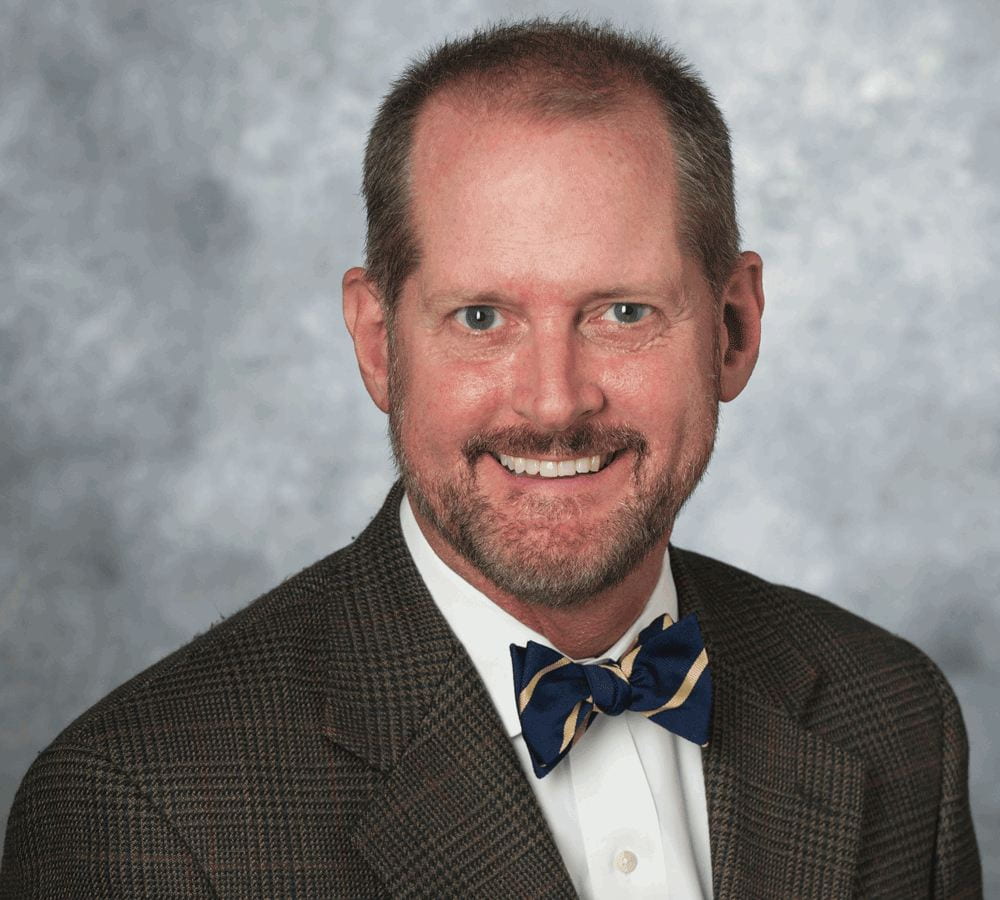
Summer’s here, and Roy Heller is heading to camp.
 As he has for the past 13 years, Heller will spend the summer serving as chaplain of Camp O-AT-KA, an overnight camp on the shores of Sebago Lake in southern Maine. The 114-year-old camp is the oldest continuously run residential camp for boys in the United States.
As he has for the past 13 years, Heller will spend the summer serving as chaplain of Camp O-AT-KA, an overnight camp on the shores of Sebago Lake in southern Maine. The 114-year-old camp is the oldest continuously run residential camp for boys in the United States.
O-AT-KA is not religiously affiliated, and Heller likes it that way.
“Being there at the camp makes me think more deeply, to ask, ‘What are those things at the core? What does it really mean to be a Christian?’” he said. Providing spiritual guidance to campers who are not religious, he added, pushes him to remember what Christian faith means at its most elemental level: compassion, service, being true to oneself.
The camp is just one way that Heller ventures outside the walls of Perkins. For the past seven years, he’s also been teaching a Bible study, Old Testament 101, on Sundays at the Episcopal Church of the Transfiguration in Dallas. “We’re meandering our way through the Bible,” he said. “It’s a class of about 70-100 people, and it’s wonderful and lifegiving. Teaching the class has given me the opportunity to share my appreciation of the beauty and literary depth of Scripture.”
In 2018, Heller published a book, The Characters of Elijah and Elisha and the Deuteronomic Evaluation of Prophecy: Miracles and Manipulation as part of The Library of Hebrew Bible/Old Testament Studies series.
Currently, he is easing into a new responsibility, as the new director of the Graduate Program in Religious Studies at SMU. Most students in the program aim for careers in academia, but he’s hoping to expose them to other career options as well.
“If there aren’t openings for someone with a Ph.D. in Medieval Theology, are there other ways they can use the skills they gained, perhaps working in libraries or museums?” he said. “I think there may be other ways to use that specialized knowledge, besides being a professor.”
Teaching Specialties
Old Testament/Hebrew Bible, Biblical Hebrew
Research Interests
Biblical Hebrew grammar and syntax, narrative criticism, rhetorical criticism, prophecy, ambiguity in literary texts
Favorite Bible Verse
The central theme Heller always comes back to is in Genesis 12:3 (NRSV), the call of Abraham, which says, “in you all the families of the earth shall be blessed.” Says Heller: “The whole reason why God calls Abraham is so that all the families of the earth will be blessed.” The verse provides a criterion for weighing beliefs, doctrines and interpretation of Scripture. “If it does not lead me toward wanting to extend blessing to everybody, it is a wrong interpretation. That universal blessing of God, hinted at in the Abraham story – that’s the goal from the beginning.”
Book on the Nightstand
Heller keeps a copy of a lifelong favorite, Charles Dickens’ A Christmas Carol, by his nightstand and rereads it often. With its messages of redemption, transformation and forgiveness, he said, “If they ever re-open the biblical canon and we get to suggest new books, I want to add A Christmas Carol.”
Fantasy Dinner Party
Heller would invite just one person, Abraham Lincoln, to his dinner. “I would ask him: ‘What is most important in life?’” he said. “I would want to get behind the politics and the history. Lincoln was very political but extremely philosophical and religious in his own way. He lived through some horrible things, both with his family and as a leader, but he was an incredibly deep, thoughtful man. I would want to know how he was able to center himself.”
Family
Wife, Amy, and two children: Noah, 23, who recently graduated from SMU, and Anne, 19, who will attend SMU in the fall.
Something Most People Don’t Know About Him
Heller is a fifth-generation native Texan. His great-great-great grandfather came to Fayette County (between San Antonio and Houston) in what was then the Republic of Texas. “People are surprised, I think, because I don’t have a Texas accent,” he said. “When I was a child, I had a horrible speech impediment and did speech therapy for many years, and that’s why I learned to speak the way I do.”
Signature dish: “I make a mean meatloaf,” he said. (The secret ingredient? Gelatin.)
Question he’d ask at the Pearly Gates: Heller’s favorite movie is “It’s a Wonderful Life,” and he’d like to have a glimpse of his life similar to the one given to George Bailey. “I’d like to know: What difference did my life make, positively or negatively?” he said.
Personal spiritual practice: Heller walks his dog, Galahad, a Rhodesian Ridgeback, twice a day, 30 minutes in the morning and 30 minutes in the evening. “It gets me outside. It’s a time to appreciate nature. I let my mind wander and wonder, which to me, is what prayer is.”
Faculty Update

Priscilla Pope-Levison, Associate Dean for External Programs and Professor of Ministerial Studies at Perkins, will be one of the preachers in the Summer Worship Series at Lake Junaluska, North Carolina, on Sunday, July 7. See the speaker lineup here.
Pope-Levison and her husband, Jack Levison, will also lead a retreat at Lake Junaluska beginning the next day, titled “Come, Holy Spirit.” Attendees will “search the world of the Spirit in the Old and New Testaments, where the Spirit hovers, fills, rushes, clothes, rests and is poured out upon people,” according to promotional materials. “By studying the Old and New Testaments in this retreat, you will learn to expect the unexpected of the Spirit, to prepare for the unprecedented and, just as important, to discover the unlikely presence of the Spirit where you might least expect it – in the grit and grime of everyday life.” For more information, visit the website here.

